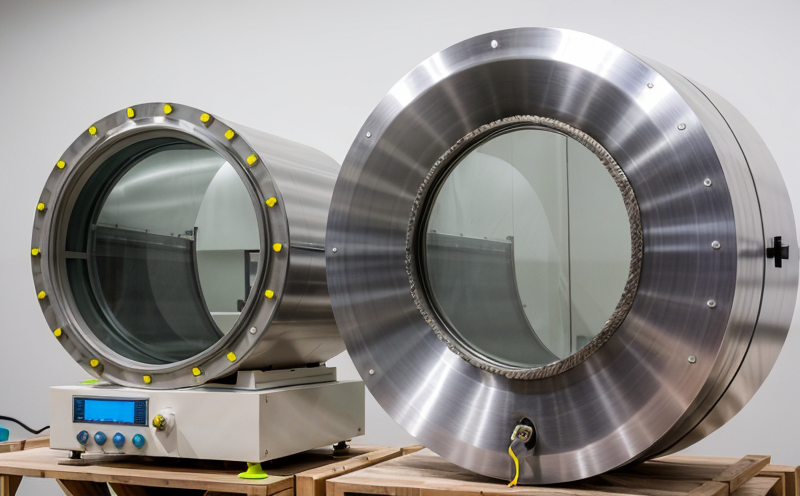Radiation Shielding Materials Testing
Testing radiation shielding materials is crucial in ensuring safety and compliance with international standards. This process involves a series of rigorous tests to evaluate the effectiveness of materials designed to block or reduce exposure to harmful radiation. In this section, we will delve into the importance of testing these materials, the types of tests conducted, and why it is essential for various industries.
The primary objective of radiation shielding material testing is to determine how well a material can absorb or deflect different types of radiation, including gamma rays, X-rays, and neutrons. This testing ensures that materials used in applications such as medical equipment, nuclear power plants, and space exploration meet safety standards set by regulatory bodies like the International Atomic Energy Agency (IAEA), the US Nuclear Regulatory Commission (NRC), and European Union directives.
There are several key tests performed on radiation shielding materials. These include:
- Transmission Testing: This test measures the amount of radiation that passes through the material, which helps determine its effectiveness in blocking or absorbing radiation.
- Dose Rate Reduction: This evaluates how much reduction in dose rate occurs when a sample is placed between the source and the detector.
The testing process typically involves preparing specimens according to ISO 8529-1 for gamma radiation shielding or ASTM E670-14 for X-ray shielding. The materials are then exposed to high-intensity radiation sources, and their performance is measured using specialized detectors such as scintillation counters or semiconductor detectors.
Accurate testing ensures that the materials perform as expected in real-world conditions. For instance, in medical settings, incorrect shielding can lead to overexposure of patients to radiation, which could have severe health implications. In nuclear applications, insufficient shielding can result in dangerous levels of exposure for workers and the surrounding environment.
Understanding the specific requirements of different industries is crucial when testing radiation shielding materials. For example, medical facilities require stringent standards to protect both staff and patients from unnecessary radiation exposure. Similarly, nuclear facilities need robust shielding materials to prevent accidental releases of harmful radiation into the environment.
Industry Applications
Radiation shielding material testing plays a vital role across various industries:
- Nuclear Power Plants: Ensures safety in handling and storing radioactive materials.
- Medical Facilities: Protects patients, staff, and the public from excessive radiation exposure during medical procedures.
- Aerospace Industry: Provides reliable shielding for astronauts and equipment during space missions.
In each of these industries, compliance with international standards such as IEC 60559-2 is essential. These standards provide guidelines on how to test materials effectively, ensuring they meet the required performance levels for radiation protection.
The aerospace industry, in particular, relies heavily on robust shielding materials due to the high-energy radiation environment encountered during space travel. The testing process must account for these unique conditions, often involving long-term exposure tests under simulated space environments.
Quality and Reliability Assurance
- Consistent Testing Protocols: Ensuring that all specimens are tested using the same procedures guarantees consistent results.
- Calibration of Instruments: Regular calibration of radiation detectors ensures accurate measurements.
Quality and reliability assurance in radiation shielding material testing is paramount. Consistent protocols ensure that every test conducted adheres to industry best practices, thereby maintaining high standards across all tests. Calibration of instruments is critical as even small discrepancies can lead to inaccurate results, which could have serious consequences if used in real-world applications.
The use of advanced instrumentation and software helps maintain precision during testing. For example, the use of Monte Carlo simulations allows for detailed modeling of radiation interactions with materials, providing insights into potential performance issues that might not be apparent through physical tests alone.
Customer Impact and Satisfaction
- Enhanced Safety: By ensuring the effectiveness of radiation shielding materials, we contribute to safer environments for workers and the public. Compliance with Regulations: Meeting international standards ensures that our customers are compliant with regulatory requirements.
Our commitment to quality and reliability directly impacts our customers' satisfaction. By providing accurate testing results, we help ensure that materials used in critical applications meet the highest safety standards. This not only enhances customer confidence but also helps avoid potential legal issues associated with non-compliance.
Our services are designed to support various industries, including healthcare and nuclear power. In these sectors, compliance with international standards is crucial for maintaining public trust and ensuring operational continuity. By offering reliable testing solutions, we help our customers achieve their goals while minimizing risks.





